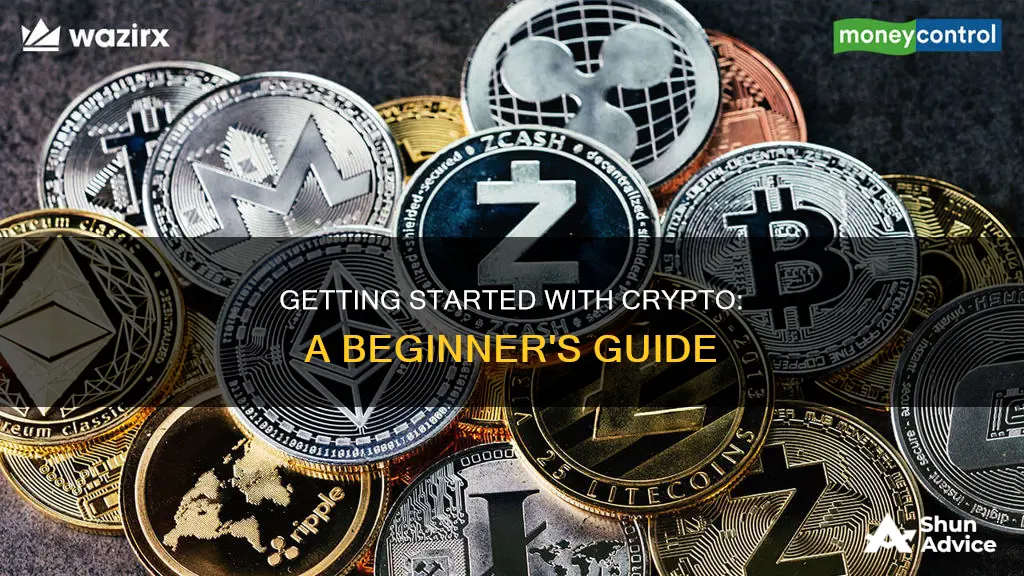
Investing in cryptocurrency is a hot topic. Cryptocurrency is a digital currency, such as Bitcoin, that is used as an alternative payment method or speculative investment. While some people are investing purely to speculate, others look at cryptos as a way to store value or hedge against inflation.
Cryptocurrencies are supported by a technology known as blockchain, which maintains a tamper-resistant record of transactions and keeps track of who owns what. The use of blockchains addressed a problem faced by previous efforts to create purely digital currencies: preventing people from making copies of their holdings and attempting to spend them twice.
If you're looking to invest in cryptocurrency, you'll need to do your research and proceed with caution. Cryptocurrencies are extremely volatile, and the industry is filled with uncertainty. There are also tax consequences to buying and selling cryptocurrencies.
- Understand the risks: Cryptocurrency is a relatively risky investment. It's important to do your research and proceed with caution.
- Diversify your investments: Consider investing in a variety of different cryptocurrencies to spread your risk.
- Do your due diligence: Research the team behind the cryptocurrency, the white paper, and the use cases.
- Manage your risk: Only invest what you can afford to lose. Don't put all your eggs in the crypto basket.
- Stay secure: Make sure to store your cryptocurrency in a secure wallet to protect your investment.
| Characteristics | Values |
|---|---|
| Purpose | Payments for services, speculative investment |
| Technology | Blockchain |
| Price | Extremely volatile |
| Regulation | Uncertain |
| Tax | Yes, taxed as property |
| Legality | Legal in the U.S. |
| Risk | High |
| Examples | Bitcoin, Ethereum, Dogecoin, Litecoin, Cardano, Solana |
What You'll Learn

Choose a crypto-trading service or venue
The first step in investing in cryptocurrency is to choose a crypto-trading service or venue, such as a cryptocurrency exchange. Cryptocurrency exchanges are platforms that allow users to buy, sell, and hold cryptocurrencies. They also enable users to transfer crypto to their online wallets for safekeeping. Examples of popular cryptocurrency exchanges in the US include Coinbase, Kraken, Gemini, and Binance. These exchanges offer a range of cryptocurrencies, including Bitcoin and a growing number of altcoins.
When creating an account with a cryptocurrency exchange, it is important to prioritize security. Users should enable two-factor authentication and create strong, unique passwords that include a combination of lowercase and capital letters, special characters, and numbers.
It is worth noting that some cryptocurrency exchanges allow users to remain anonymous and do not require personal information. These decentralized exchanges can be helpful for bringing underserved demographics, such as refugees or those living in countries with limited infrastructure, into the mainstream economy. However, popular exchanges in the US are not decentralized and follow laws that require users to submit identifying documentation.
In addition to cryptocurrency exchanges, there are other options for purchasing cryptocurrencies, such as payment services like PayPal and mainstream brokerage firms like Robinhood or Fidelity. Bitcoin ATMs are also becoming increasingly popular and provide an in-person method for buying Bitcoin with cash.
Why You Should Consider Investing in Bitcoin Investment Trust
You may want to see also

Connect your exchange to a payment option
Connecting your exchange to a payment option is the second step in the process of investing in cryptocurrency. This step involves linking your bank account, debit card, or credit card to your chosen exchange platform. It is worth noting that credit cards are not accepted by all exchanges due to the associated processing fees and the risk of fraud.
The specific process of connecting your exchange to a payment option will vary depending on the platform you choose. However, most exchanges will require you to provide personal identification information, such as a picture of your driver's license or Social Security card. Some exchanges may also ask for additional details, such as information about your employer and the source of your funds. This process is similar to setting up a typical brokerage account.
Once you have provided the necessary information, you can proceed to link your bank account, debit card, or credit card to your exchange account. It is important to consider the fees associated with each payment method, as they can vary for deposits and transactions. For example, using a credit card to purchase cryptocurrency can result in higher overall costs due to the combination of transaction fees and credit card interest charges.
Additionally, it is worth noting that some banks may question or even stop deposits to crypto-related sites or exchanges. Therefore, it is advisable to carefully review the policies of your financial institution before proceeding.
By connecting your exchange to a payment option, you will be able to fund your account and start purchasing cryptocurrencies. Remember to always do your research and choose a reputable and secure exchange platform to protect your personal and financial information.
The Ultimate Guide to Investing in Bitcoin Stock
You may want to see also

Place an order
Once you have chosen a crypto-trading service or venue, connected your bank account or card, and set up two-factor authentication, you can place an order.
Most crypto exchanges offer market and limit orders, and some also offer stop-loss orders. A market order is an instruction to buy or sell cryptocurrency immediately at the best available price. A limit order is an instruction to buy or sell cryptocurrency at a specific price or better. A stop-loss order is an instruction to sell cryptocurrency if its price falls to a certain level, and is used to limit losses.
Some exchanges, such as Kraken, offer a wider range of order types, including take-profit and take-profit limit orders. Take-profit orders are used to automatically close out a trade when it reaches a certain level of profitability.
Exchanges also offer ways to set up recurring investments, allowing clients to dollar-cost average into their investments of choice. For example, Coinbase lets users set recurring purchases for every day, week, or month.
Mars Coin: A Good Investment Option?
You may want to see also

Store your cryptocurrency
Once you've bought your cryptocurrency, you'll need somewhere to store it. You can either use a software wallet or a hardware wallet. Software wallets are necessary for active trading as they make accessing your currency much easier. If you sign up for a Coinbase account, for example, you'll automatically receive a Coinbase software wallet.
Hardware wallets are physical devices that look a bit like USB drives. They are more secure than software wallets but less convenient for active trading. You can use them for currencies that you don't expect to need frequent or easy access to. Think of a software wallet as a checking account, while a hardware wallet is more like your savings account.
It's important to keep your cryptocurrency secure. Because a bitcoin wallet or exchange account can be compromised, it's crucial to find out about and practice safe storage. Services such as Coinbase, PayPal, and Robinhood, among others, sell bitcoin.
Hot Wallets vs Cold Wallets
Online wallets, also known as hot wallets, are apps on devices such as computers, phones, or tablets. These wallets generate the private keys to your coins on internet-connected devices. Hot wallet holders who haven't created enough security run the risk of losing funds to theft.
A cold wallet, on the other hand, isn't connected to the internet and is therefore less likely to be compromised. These offline wallets or hardware wallets store a user's private key on something that isn't connected to the internet and come with software that allows investors to view their portfolio without putting their private key at risk.
Cold wallets are the most secure way to store your cryptocurrency but they require technical knowledge to set up.
Maximizing Crypto Mining Equipment Investment Tax Deductions
You may want to see also

Understand the risks
Before investing in cryptocurrency, it is crucial to understand the associated risks. While the potential for high returns exists, it is a highly volatile and unpredictable market. Here are some key risks to consider:
Volatility and Uncertainty
Crypto prices are extremely volatile, and the market can experience rapid and significant shifts. This means that while some people have made quick profits, many others have lost money by investing just before a crash. These wild fluctuations may also deter people from using cryptocurrencies as a payment system, as they cannot be sure of their value from one day to the next.
Regulatory Changes and Uncertain Future
The regulatory landscape for cryptocurrencies is still evolving, and government interventions or crackdowns could significantly impact the market. The long-term viability of many cryptocurrencies is uncertain, and there is a possibility that some may flame out, similar to the dot-com bubble.
Security and Consumer Protection
Direct ownership and transactions of cryptocurrencies are largely unregulated, and consumer protection in this area is limited. The lack of security measures means that crypto wallets and exchange accounts are vulnerable to being compromised, leading to potential financial losses.
Tax Implications
The tax rules surrounding cryptocurrencies are still being established, and the existing regulations can be complex and cumbersome, especially when using crypto to make purchases. It is important to consult an accountant or tax advisor to understand the tax implications of trading or using cryptocurrencies.
Environmental Impact
The energy consumption and environmental impact of some cryptocurrencies, particularly those using mining protocols like Bitcoin, are significant. This has led to increased scrutiny and could potentially affect their future viability.
Fraud and Scams
The decentralized and unregulated nature of cryptocurrencies makes them susceptible to fraud, scams, and abuse. It is important to carefully research any crypto investment opportunities and be cautious of potential scams.
Limited Consumer Adoption
Despite the hype, cryptocurrency adoption among the general public remains relatively low. The utility and acceptance of cryptocurrencies as a mainstream payment method are still limited, and their value is largely driven by speculation.
In conclusion, investing in cryptocurrencies carries significant risks that potential investors should carefully consider. It is important to treat crypto investments as a high-risk, speculative portion of your portfolio and only invest what you can afford to lose. Diversification and thorough research are essential to mitigating these risks.
A Beginner's Guide to Investing in EOS Crypto
You may want to see also
Frequently asked questions
Some popular cryptocurrency exchanges include Coinbase, Gemini, eToro, Robinhood, SoFi Invest, Kraken, and Binance.
First, choose a crypto-trading service or venue, such as a cryptocurrency exchange. Then, connect your exchange to a payment option, such as your bank account or credit card. Next, place an order for the cryptocurrency you want to purchase. Finally, ensure safe storage for your purchased cryptocurrency, such as in a hot or cold wallet.
Cryptocurrency is a highly speculative and volatile investment, with little consumer protection. Its value is based solely on the expectation that someone else will be willing to pay more for it in the future. There are also tax consequences to buying and selling cryptocurrencies.
Investing in cryptocurrencies should only be done with a portion of your portfolio, as it is a relatively risky investment. Make sure to diversify your investments and consult a financial advisor to help you create an investment plan that aligns with your risk tolerance.







